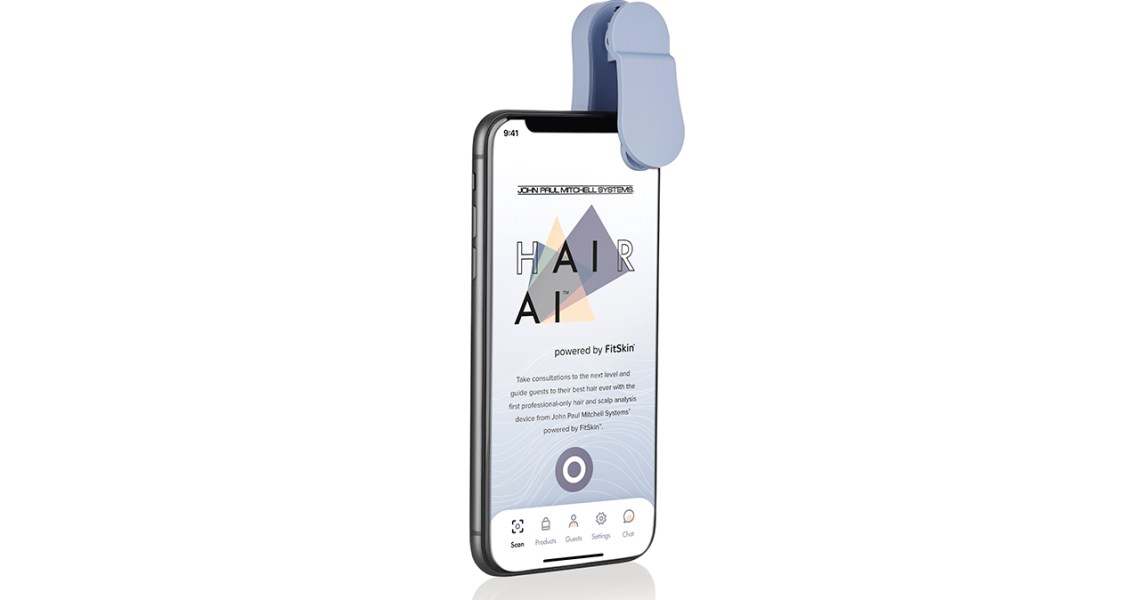John Paul Mitchell Systems, the privately held hair-care conglomerate, plans to launch a new artificially intelligent hair and scalp device in November, adding to a growing list of scalp and hair tools that have debuted in 2020.
The proprietary device, simply called Hair AI powered by Fitskin, will only be available to its JPMS wholesale salon customers. It promises to evaluate a consumer’s hair and scalp, and recommends 10 products on average from across the JPMS portfolio of eight brands. JPMS has two hair tool brands, as well as styling products and professional hair dye that are distributed in 108 countries through 150,000 salons and Ulta. It also maintains 114 hair-styling schools globally; global sales to salons account for 95% of JPMS’ revenue and 70% of its U.S. business comes from smaller salons, according to previous Glossy reporting. In November, JPMS is giving a complementary device to 2,500 salons that are part of the company’s platinum top loyalty tier, while other salons can receive it for free as a gift-with-purchase of one of four $225 kits in January 2021. The thinking behind the device and complimentary offering is to provide JPMS salon clients with a better sales edge, as salons increasingly compete with Amazon and retailers like Sephora and Ulta when it comes to selling hair-care products. According to industry sources, approximately 25% of any salon’s revenue comes through product sales, and Covid-19 hit the salon industry hard.
“This device empowers stylists to give that customized recommendation. They’ll be empowered to offer those in-salon treatments and, have revenue opportunities that way,” said Tania Kingsrud, John Paul Mitchell Systems vp of marketing. “[Hair care sales] are very competitive, with Amazon, e-commerce and specialty retailers in the market, so we want to give [salons] an even play in that field.”
The Hair AI device works as a clip-on camera device for iPhones and analyzes an undisclosed number of data points, such as scalp flakiness and hair strand breakage, through an accompanying app. It adds to a number of hair and scalp devices that launched this year, such as the Réduit misting scalp device from former Foreo CEO Paul Peros in May, and BeautyBio’s scalp microneedling device which entered Ulta, Nordstrom and Sephora on October 5. As Glossy previously reported, the skinification of hair is reaching new levels; devices only add to that increased sales opportunities for the larger category.
“[Individuals] make assumptions all the time about what products are going to be great for them,” said Valerie George, John Paul Mitchell Systems vp of research and development. “Products are expensive, and it really stinks to get a product that you wanted to like, but it just wasn’t right for your hair. It doesn’t mean it’s a bad product — it just wasn’t right for you.”
Because the Hair AI device only suggests JPMS products, it can’t provide a truly objective recommendation that factors in other hair-care options available on the market. Not all salons offer only one brand of products, either, though Kingsrud said offering this device could convince some salons to switch over to JPMS exclusively. The device has not been independently reviewed for its clinical value, which is a chronic issue for devices and products in the beauty industry. And, it relies on a cellphone’s camera quality; George asserted that most smartphone cameras are just as high performing as any DSLR, but a study from Strategy Analytics in 2019 found that people are delaying new smartphone purchases by three or more years. Different cameras from older models could potentially provide varying results, though George said the device acts as a magnifying glass and can capture images zoomed in to appear 30-times their size and adjust to taking photos automatically in optimized lighting.
“This is an opportunity for salons to create a greater connection with their guests and enhance that experience in the salon,” said Kingsrud. “Give guests customized recommendations that are good for them, and it’s going to keep them happy. Plus it’s going to grow the salon business in a natural way.”
Ad position: web_incontent_pos1




